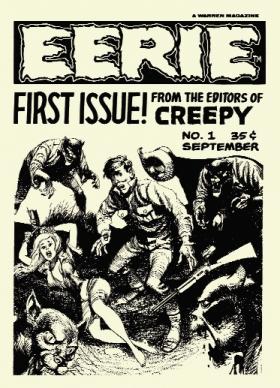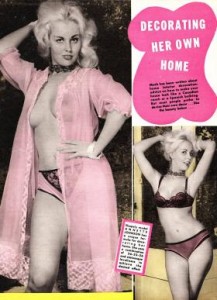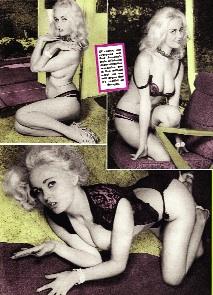‘Unrelenting deference’? Official resistance to Catholic moral panic in the mid-twentieth century
Published in 20th Century Social Perspectives, 20th-century / Contemporary History, Features, Issue 1 (Jan/Feb 2010), Volume 18
The availability of horror comics such as this provoked periodic fits of moral panic in Ireland. Note that this first edition of Eerie ‘magazine’ is in black and white and therefore not subject to the USA’s Comics Code Authority (the equivalent of Hollywood’s Hayes Code), set up in 1954 in response to fears about the corruption of juveniles. Moral panics were not unique to Ireland. (Eerie, September 1965)
The relationship between church and state went to the heart of Irish politics and society for much of the twentieth century and is obviously of central relevance to the history of Irish sexuality. But the hierarchy was not always strident or, on the surface, demanding. What is most striking is the extent to which politicians continually asked for guidance.
When a government committee had investigated the incidence of venereal disease in the Free State in 1927, a meeting was arranged between a government representative and Archbishop Byrne of Dublin, who was ‘hesitant in giving an opinion either for or against publication’ of the VD report; after pressure from the government representative, however, Byrne ‘made it clear he rather favoured postponement of publication’. The government acquiesced. In 1932, in the aftermath of the Carrigan Committee’s report, which investigated whether a revision of the law was required regarding sexual offences against young people and in relation to juvenile prostitution, Minister for Justice James Geoghegan instigated a meeting with the bishops to discuss changes in the law and informed them that he wanted a bill ‘which would bring the law into accord with the best Catholic practice and teaching on these subjects’.
Private scepticism at perceived scaremongering
There are many other examples that could be given of this unofficial, behind-the-scenes deference, but there is also documentation revealing occasions when the church did not get its way and tensions around the issue of who was best positioned to police Irish sexual behaviour. What has been overlooked in particular is the private scepticism on the part of some civil servants and politicians in reaction to what they perceived as exaggerated scaremongering about sexual morality.
In a memorandum prepared in the Department of Justice in July 1938 by its secretary, Stephen Roche, in the context of the possible appointment of women police, reference was made to a ‘rather alarming document’ received the previous month, which suggested that ‘offences against morality were increasing in that city [Cork] to a really serious extent’. Several Catholic priests, Protestant and Presbyterian clergymen and representatives of other social and religious organisations in the city had signed the document. Roche elaborated:

British glamour model Annette Johnson, who featured in an 8mm home movie, Dream of Annette. In 1965 McQuaid made representations to the Department of Justice objecting to the distribution in Ireland of advertising material for the film. (Parade, 20 February 1965)
‘On the other hand, it was not signed by the Catholic bishop (Dr Cohalan). I learned afterwards that the bishop knew of it and didn’t like it. I wrote to the local DJ [district justice], Mr D. B. Sullivan, and his reply confirmed, in strong terms, the suggestion that there was something seriously wrong in Cork and in particular he referred to the number of young girls who had come before him in connection with offences of this class, their apparent shamelessness and their readiness to commit perjury. I then asked Assistant Justice [Henry] McCarthy, in whose ability and discretion I have great confidence, to go down to Cork and investigate matters on the spot (he had just returned from Geneva where he had been representing our government at a women and children protection conference). In sum, he seems to think that both the local justice and the petitioners have exaggerated the gravity of the situation but that there is a lot of immorality and need for some action. Personally, my habit of thought is to be rather sceptical as to the results of state interference in these matters. I have the feeling that the rising generation in Cork are going Pagan despite all that the churches and the teachers and the voluntary organisations can do; the situation cannot be served by the appointment of a few more state officers, whether men or women. So far as I can see, what the petitioners are really looking for is a body of special police who will patrol the streets of Cork, asking young girls where they are going and sending them home if they are not satisfied with the answers. There is no power in law for any officer to do this and the general theory of the law is that people can be as immoral as they like provided they do not come up against some special provision of the law.’
Such frankness was unusual, and he touched upon a number of issues that were relevant to the degree of ‘moral panic’ that had been highlighted in the government inquiry into venereal diseases and the Carrigan Report. Roche was clearly sceptical about how justified such panics were and how far the law could extend, and was conscious of the need for the state to be mindful of the civil rights of its citizens, a preoccupation of officials in the Department of Justice that had also surfaced in relation to the issue of raids on suspected brothels. There was also an underlying sense of the state wanting to wash its hands of this, on the grounds that if the first line of moral defence—the Catholic Church—could not prevent these activities, how was the state going to deal with them?
Civil servants wary of zealots
 Roche was no radical on these issues. In his fawning correspondence with archbishop of Dublin John Charles McQuaid concerning censorship, he suggested regarding their contacts that ‘there is no pleasanter privilege attached to my duties . . . do please give me a summons over the telephone anytime you want me to call’. But in truth, Roche and other civil servants were wary of the zealots intent on returning Ireland to a (mythical) state of sexual purity and chastity. There is also evidence that, in relation to pornography and horror comics, civil servants north and south were privately cynical about censorship and the periodic fits of moral panic on both sides of the border. Humorous, affectionate and satirical correspondence between Roche’s successor, Thomas Coyne, and A. Lynch Robinson, secretary to the Ministry of Home Affairs in Belfast, in 1954 revealed their true feelings on these matters. They were dismissive of the idea that the state had any role to play in policing morals. Robinson, for example, believed that ‘the modern child is beyond any corrupting influence which the adult is capable of devising. However, mine not to reason why’, to which Coyne responded that ‘there is no spectacle so ridiculous as the British public in one of its periodical fits of morality’.
Roche was no radical on these issues. In his fawning correspondence with archbishop of Dublin John Charles McQuaid concerning censorship, he suggested regarding their contacts that ‘there is no pleasanter privilege attached to my duties . . . do please give me a summons over the telephone anytime you want me to call’. But in truth, Roche and other civil servants were wary of the zealots intent on returning Ireland to a (mythical) state of sexual purity and chastity. There is also evidence that, in relation to pornography and horror comics, civil servants north and south were privately cynical about censorship and the periodic fits of moral panic on both sides of the border. Humorous, affectionate and satirical correspondence between Roche’s successor, Thomas Coyne, and A. Lynch Robinson, secretary to the Ministry of Home Affairs in Belfast, in 1954 revealed their true feelings on these matters. They were dismissive of the idea that the state had any role to play in policing morals. Robinson, for example, believed that ‘the modern child is beyond any corrupting influence which the adult is capable of devising. However, mine not to reason why’, to which Coyne responded that ‘there is no spectacle so ridiculous as the British public in one of its periodical fits of morality’.
In the 1950s the minister for justice, Gerry Boland, was also increasingly dismissive of the hysterical tone of those advocating greater censorship. In September 1957 Taoiseach Éamon de Valera received a letter from the Irish League of Decency requesting an interview:
‘This letter is written as a despairing cry from a frustrated body of Catholics to clean-up on indecent books, picture-post cards, films etc. . . . we have done almost all we can—we are still storming heaven—within the law to combat the imported press and film evils, but are being thwarted by the very law itself and so find ourselves foiled to remove sources of scandal from public display . . . where are we? Where do we go from here? We must and will carry on the fight . . . Mr De Valera, for our dear Lady’s sake at least grant us an interview that we may show you some of the stuff being sold in Catholic Ireland—it’s even going the round in the classroom.’
The government response was blunt and contemptuous. In a letter from the Department of Justice to the taoiseach’s private secretary, Boland wrote:
‘The minister is not prepared to receive a deputation from this body. It is apparent from communications received from their secretary over a number of years that the League have very exaggerated notions of what is indecent and any discussions with them could not fail to be embarrassing.’
‘Apotheosis of the so-called teenager . . . no good can come of it’
During his correspondence with Archbishop McQuaid in March 1960, Thomas Coyne referred to the magazines that were being eagerly embraced by young people: ‘If there is one thing more than another about this day and age which I personally dislike it is the apotheosis of the so-called teenager and I believe no good can come of it’. But like his predecessor Roche, despite his personal views, Coyne was consistent in informing McQuaid that the state on its own could not provide ‘a wholly satisfactory solution’. Enclosed in the correspondence between them in the same year was an advertisement from the Observer newspaper of 3 April 1960, in which a proud mother and her daughter, wearing her new bra, were beaming at each other, under the heading: ‘Delightful news for the understanding mother: New bras and girdles specially designed for 11–16 year olds’. McQuaid was disappointed that the state was not doing more to prevent the circulation of such advertisements, and was not satisfied with Coyne’s insistence that ‘if the state is encouraged or even allowed to become an arbiter of morals, it may be tempted to usurp the functions of the church’.
‘A task for the priest, not the policeman’
Coyne wrote about the variety of ‘unwholesome thrash’ now in existence in Ireland, ‘which have a demoralising effect not merely on the weak-minded but on the weak-willed as well and are a greater menace because they are retailed at a price which is low enough to give them a relatively wide circulation’. But it was difficult to name and shame because of the ‘practical impossibility of specifying all such publications and the risk that those left unspecified might be wrongfully presumed to have ecclesiastical approval’. Coyne maintained that the onus was on the church to ‘check the false emphasis on sex . . . the moral flabbiness and the false philosophies that are so much in vogue. This, as I see it, is a task for the priest, not for the policeman’. He then referred to the bra advertisement: ‘This is the sort of thing that cannot possibly be suppressed by the State without the State appearing to make itself ridiculous, which the civil authority is always unwilling to do’.
Five years later McQuaid made representations to the Department of Justice about a company called Heritage Films who were advertising 8mm home movies, including one featuring Annette Johnson ‘at her dreamiest best’ in Dream of Annette: ‘One of Britain’s loveliest nude models in this very artistic movie, incorporating slow motion and excellent lighting effects’. Unusually, McQuaid contacted Coyne at home, asking him whether he could block the entry into Ireland of this type of material; a chemist had sent it on to McQuaid, pointing out that it had been sent to all chemists selling photographic material. Coyne informed McQuaid that it would be stopped by Customs if they found the film itself but that ‘the advertising material is more difficult to detect’.
Significantly, there was also a note by Coyne attached to this correspondence for the minister for justice, suggesting that he was no longer a regular correspondent of McQuaid’s, probably because he had reiterated on so many occasions that the state’s role in censorship was in his view quite limited: ‘It is rather curious that his Grace should write to my home. This is my first contact with him in 1965. At one time he used to phone me and write to me about all sorts of problems’. The tone of his note suggests that he was relieved at no longer having to endure McQuaid’s tiresome complaints on a regular basis. HI
Diarmaid Ferriter is Professor of Modern Irish History at UCD.
Further reading:
D. Ferriter, Occasions of sin: sex and society in modern Ireland (London, 2009).
M. Luddy, ‘Sex and the single girl in 1920s and 1930s Ireland’, The Irish Review 35 (Summer 2007), 79–92.
S. Riordan, ‘Venereal disease in the Irish Free State: the politics of public health’, Irish Historical Studies 35 (139) (May 2007), 345–65.
















